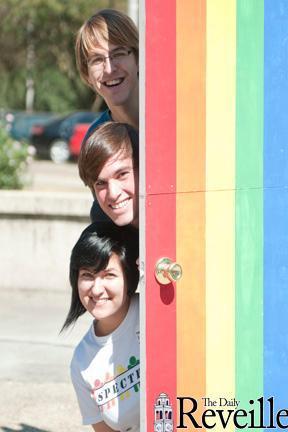Political dialogue can get frustrating here at the University. Over the past few years we’ve fallen victim to the notorious Southern trap of political isolation: We hold the line, fight change and discourage uncomfortable topics – uncomfortable meaning nontraditional. But the fault doesn’t entirely lie on the culture. Social change requires movers – movers we have been lacking to an alarming degree. I remember, as a young freshman, attending my one and only meeting with Atheists, Humanists and Agnostics (AHA). There were about six in attendance including the speaker, and while one slept through the discussion, another bickered with the speaker on the semantics of metaphysics – enthralling, indeed. I also remember, as a reporter about a year ago, when getting photographs of Spectrum members at public events was about as hard as prying information from the University’s Athletic Department. And then that same year, I noticed another missing tooth in our crooked Southern smile: We had no Democratic student group to stand against our underperforming College Republicans chapter – but it’s easy to get lazy with no competition. We can hardly call ourselves a community – or university – without these crucial voices. We need them to make us think and then rethink, to make us argue and grow and learn about the world and people we live with. And change is finally on the horizon, thanks to renewed initiative among our beloved fringe groups. We now have a budding College Democrats chapter, a more active AHA and deeper collaboration among various social advocacy groups, including Spectrum. “It’s easier to oppress a group when they have no voice,” said Spectrum President Shane Cone. “It’s important to show that there are a lot of different viewpoints at this university.” Cone’s sentiments are mirrored by AHA President Alexander Fuglaar, who’s working to encourage deeper collaboration between marginalized student groups. “When their rights are in jeopardy, so are ours,” said Fuglaar. “When one group starts taking one minority’s rights, they don’t necessarily stop with that one minority.” It is indeed easier to stereotype and suppress individuals about whom one knows little, and this applies to atheists, feminists, the LGBTQ community and numerous other minority groups, especially religious ones. Progress by any of these groups is progress for all marginalized individuals. “Atheists are right there with homosexuals – they are also commonly mistrusted and disliked just for their views,” Cone elaborated. And these groups should use that fact by supporting one another for more mobilization. We need engagement between political parties on campus. We need engagement between religious and nonreligious groups. Mutual endorsement and advocacy is one step in the right direction, but there remains work to do. Our minority groups need to speak up and be proud – and visibly so. Too often comments referencing “our backwards Southern culture” come from individuals who either do not publicly own up to their beliefs or do nothing to foster change, like complaining about politics without voting. Band together and make a change – the community needs you. College is about exposure and experience. Classes will do half the work, but the rest is up to the community and the myriad interest groups within it.
Clayton Crockett is a 20-year-old international studies junior from Lafayette.
____ Contact Clayton Crockett at ccrockett@lsureveille.com
The New Frontiersman: Collaboration among advocacy groups on campus a good sign
August 22, 2012








